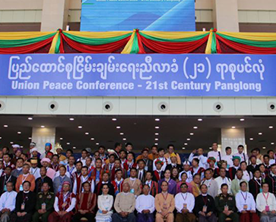The new Union Peace Conference will be held on May 24, according to Zaw Haty, director general at the Ministry of the State Counsellor’s Office. Zaw Htay announced the date during his session with media outlets following a Joint Implementation Coordination Meeting on the Nationwide Ceasefire Agreement (NCA) held on April 24 in Naypyidaw.
The Joint Implementation Coordination Meeting (JICM) was convened for the first time under the current government and attended by State Counsellor Aung San Suu Kyi, Deputy Commander-in-Chief of the Tatmadaw Vice-Senior General Soe Win and representatives from eight ethnic armed groups who have ratified the NCA. Minister for the Office of the State Counsellor Kyaw Tint Swe, Chair of the Government’s Peace Commission Dr. Tin Myo Win, Union Attorney-General Tun Tun Oo, deputy union ministers and high-ranking Armed Forces officials also took part in the meeting.
At the meeting, attendees discussed a wide range of issues including setting the date to convene the 2nd Union Peace Conference – 21st Century Panglong, the development of an all-acceptable fundamental policy at the conference, the amendment and supplementation of mandates of the various levels of the JMC (Nationwide Ceasefire Agreement – Joint Monitoring Committee), confirmation of the Standard Operating Procedures (SOP) decided by the JMC, coordination between the relevant bodies to fulfil the needs for the development of ethnic regions and more inclusion of ethnic armed groups in the peace process of the nation.
The Joint Implementation Coordination Meeting is held according to subparagraph (a – 1) of paragraph (21) of Chapter (5) of the NCA. Previously, a JICM meeting was convened immediately after signing the NCA between the Government and eight ethnic armed groups from October 15 to October 17, 2015 in the presence of former president Thein Sein. The Joint Monitoring Committee (JMC) and the Union Peace Dialogue Joint Committee (UPDJC) were formed at the meeting. The JMC was created to monitor the multilateral compliance of the NCA and the UPDJC was intended to oversee political dialogues at state, region and local levels as well as the Union Peace Conference.
The Union Peace Conference is a result of the peace-building efforts of the previous government. The convention is maintained and dubbed as the 21st Century Panglong by the NLD-led administration. The first edition of the 21st Century Panglong was held in Naypyidaw starting from August 2016. Originally, it was planned to hold the conference every six month until a common agreement was reached between the Government, the Tatmadaw (the Armed Forces of Myanmar) and ethnic armed organisations. The conference originally accepted only NCA-signatory ethnic groups to participate in discussions; those who had not ratified the agreement were only allowed to attend as observers.
National and regional political dialogues have taken place in certain ethnic regions to compile input on political, economic, social and ethnic matters and concerns in accordance with the rights entitled to ethnic nationalities. The talks cover politics, economics, social affairs, security, land use and natural resources. The Union Peace Conference, during which issues like State defence and the establishment of a federal union will be tabled, will review and decide to adopt the solutions from national or regional political talks carried out by ethnic races. Following the first edition of the Union Peace Conference – 21st Century Panglong in September, 2016, convention participators decided to hold national or regional political dialogues.
On October, 15 2016, the Myanmar government announced the Seven Steps Roadmap for national reconciliation and Union peace as follows:
- To review the political dialogue framework.
- To amend the political dialogue framework.
- To convene the Union Peace Conference—the 21st Century Panglong in accordance with the amended and approved political dialogue framework.
- To sign a union agreement— the 21st Century Panglong Conference Agreement based on the results of the 21st Century Panglong Conference.
- To amend the constitution in accordance with the union agreement and approve the amended constitution.
- To hold the multi-party democracy general elections in accordance with the amended and approved constitution.
- To build a democratic federal union in accordance with the results of the multi-party democracy general elections.
It was under the previous administration, on 15 October 2015 that Myanmar government signed the historic NCA with eight ethnic armed groups namely All Burma Students’ Democratic Front (ABSDF), Arakan Liberation Party (ALP), Chin National Front (CNF), Democratic Karen Benevolent Army (DKBA), Karen National Liberation Army-Peace Council (KNLA-PC), Karen National Union (KNU), Pa-O National Liberation Organization (PLO) and Shan State Army-South (SSA-S/RCSS).
But, other armed groups including the country’s largest insurgent forces such as the United Wa State Army (UWSA), the Kachin Independence Army (KIA) and the Shan State Army-North (SSA-N) did not enter the agreement. Three other groups — the Ta’ang National Liberation Army (TNLA), the Myanmar National Democratic Alliance Army (MNDAA) and the Arakan Army (AA) — have been excluded from the NCA as they are still engaged in fighting with the Tatmadaw.










